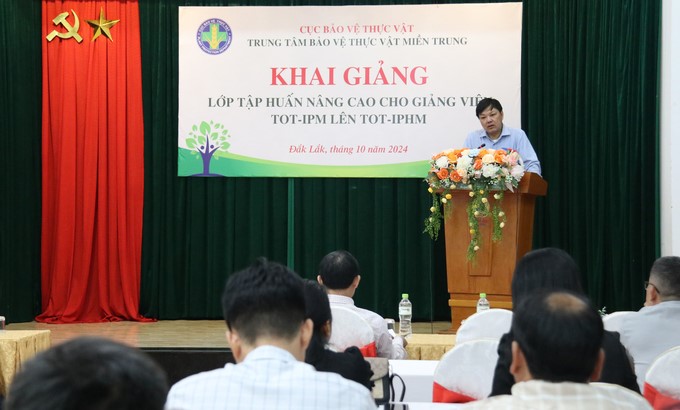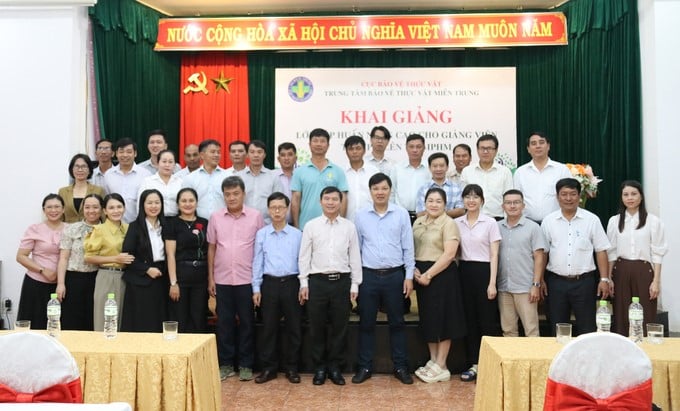May 20, 2025 | 21:05 GMT +7
May 20, 2025 | 21:05 GMT +7
Hotline: 0913.378.918
May 20, 2025 | 21:05 GMT +7
Hotline: 0913.378.918
According to the Central Regional Plant Protection Center, since 2022, the Ministry of Agriculture and Rural Development has issued a Decision approving the "Action plan to promote the application of integrated plant health management (IPHM) on key crops in Vietnam in the 2022–2030 period.".
On that basis, the Plant Protection Department has issued a decision approving the outline for implementing the task "Developing applications for integrated pest management (IPM/IPHM) and biological measures to prevent harmful organisms on plants” in 2024.

Mr. Luong Anh Tuan, Director of the Central Regional Plant Protection Center, spoke at the opening of the training class. Photo: Quang Yen.
The Central Regional Plant Protection Center was assigned by the Plant Protection Department to organize an advanced training class for TOT-IPM teachers on TOT-IPHM in Dak Lak.
Participating in the training class, TOT-IPM teachers will be supplemented with knowledge about integrated plant health management so that these teachers have enough knowledge and conditions to teach TOT-IPHM classes. Thereby creating a source of IPHM teachers for the provinces to train and organize TOT-IPHM classes at the provincial level and train local farmers (FFS) on integrated plant health management (IPHM).
According to the Central Regional Plant Protection Center, current coverage of the IPHM program is limited due to a lack of investment funding. The number of IPHM teachers trained in recent years across the country has increased significantly. However, there is a difference in the number of teachers in each locality.
Therefore, the class, with the participation of 30 students and the companionship of five national TOT-IPHM teachers, will contribute to promoting the IPHM program in localities.
Mr. Luong Anh Tuan, Director of the Central Regional Plant Protection Center, said that since 2020, world scientific forums with the participation of many international organizations have met to discuss the "One Health" topic.
According to Mr. Tuan, this is an integrated approach to the basic relationships between human health, animal and plant health, and environmental health. During the process of discussion, opinions from many developed countries assumed that it was necessary to pay attention to plant health.

The training class, with the participation of 30 students and the companionship of five national TOT-IPHM teachers, will contribute to promoting the IPHM program in localities. Photo: Quang Yen.
"Plants are a source of products for humans and are used as feed for livestock production, as well as having many other values and benefits. If the plants are not healthy and the products are not safe, they will affect human health.
On that basis, the Plant Protection Department has proposed that the Ministry of Agriculture and Rural Development develop a program and action plan to implement the integrated plant health management (abbreviated as IPHM) program on the basis of inheriting the integrated pest management (IPM) program in Vietnam. In 2024, the Center was assigned by the Plant Protection Department to organize IPHM teacher training classes and farmer training classes (FFS) on durian trees in some Central Highlands provinces," Mr. Tuan said.
Mr. Tuan hopes that students will acquire professional knowledge and skills when studying and experiencing at the training class, as well as combining group working skills; field classroom (FFS) instruction skills; communication and dissemination skills; non-formal training methods for older people; and propagating and disseminating knowledge.
“Currently, plant health management is regulated as a criteria in the new rural assessment. With this regulation, developing TOT-IPHM teachers in the coming time is very necessary. At the end of the class, TOT-IPHM teachers will be qualified to be teachers in provincial training classes, coaching, guiding the community, or training farmers on IPHM," Mr. Tuan added.
Translated by Thu Huyen

(VAN) Japan's grant aid project contributes to capacity building, promoting organic agricultural production, and fostering sustainable community development in Dong Thap province.

(VAN) For years, the CRISPR-Cas9 genome technology has been reshaping genetic engineering, a precision tool to transform everything from agriculture to medicine.

(VAN) Vietnam aims to become a 'leader' in the region in the capacity and managing effectively soil health and crop nutrition.
![Reducing emissions from rice fields: [Part 1] Farming clean rice together](https://t.ex-cdn.com/nongnghiepmoitruong.vn/608w/files/news/2025/05/05/z6509661417740_a647202949c539012a959e841c03e1d3-nongnghiep-143611.jpg)
(VAN) Growing clean rice helps reduce environmental pollution while increasing income, allowing farmers to feel secure in production and remain committed to their fields for the long term.
/2025/05/19/5136-1-144800_230.jpg)
(VAN) The Nghe An Provincial People's Committee has just approved the list of beneficiaries eligible for revenue from the Emission Reductions Payment Agreement (ERPA) in the North Central region for the year 2025.

(VAN) 14 out of 35 domesticated elephants in Dak Lak province have had their living conditions improved, with 11 of them currently participating in the non-riding elephant tourism model.

(VAN) Muong Nhe Nature Reserve hopes that being upgraded to a national park will lay the foundation for forest protection efforts to be carried out in a systematic, modern, and sustainable manner.